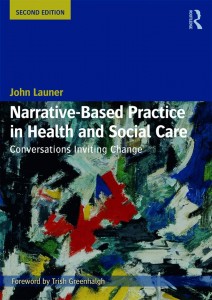 Let me begin in medias res, using John Launer’s example of the difference between a normative and a narrative-based approach. Here are his examples of the two approaches: conversations during a home visit by two different occupational therapists:
Let me begin in medias res, using John Launer’s example of the difference between a normative and a narrative-based approach. Here are his examples of the two approaches: conversations during a home visit by two different occupational therapists:
Therapist A: Well, as you know, I’ve come to look at your home because of your falls.
Client: I’ve had a lot of them lately.
Therapist A: Yes, your social worker mentioned that. So let’s go round and look at what we can do for you.
Therapist B: Well, as you know, I’ve come to look at your home because of your falls.
Client: I’ve had a lot of them lately.
Therapist B: Did anything cause this do you think?
Client: Oh, I thought the social worker would have told you. My son used to live here and always helped me to get around.
Therapist B: Is he not here anymore?
Patient: No, that’s the terrible thing. He got killed in a car accident….
Beyond the dramatic event that emerges only from the narrative approach – one that remains untold in the normative style – I wanted to start my commentary with this wonderful example to give an idea of the power of John Launer’s book.
I have been working side by side with Dr. Launer for six years in the Italian Masters in Applied Narrative Medicine. The things that leave me breathless are his sharp and acute mind when focusing on the problem and his sensibility towards the feelings of the other: together, these ingredients form his art in developing conversations that not only invite but “make” a real change.
Dr. Launer, through his multiple backgrounds, has the knowledge to choose the right questions, respecting the rhythm of the conversation, drawing clients and the patients forward in simple steps that open new horizons of thoughts, emotions and praxis. Good conversations, as I have assisted John to carry out many times, need last no more than 15, or a maximum of 20 minutes: periods of time that are eco-friendly in our health care system and can be easily brought into daily social and clinical practice if we want to. And more than this – they can be brought into our ordinary daily lives.
After my many years of schooling in counselling and narrative medicine, I have learnt from John how to ask questions: open, following the story of whoever is the narrator, avoiding (and this is a very difficult part) any reinterpretation and any judgment; or, even more difficult than these two elements, jumping easily into fast solutions, as a prepared algorithm. The opening of new scenarios is what the client will take home and will continue thinking about, mainly later: according to the skills of John Launer, any innovative strategy, any creative action will pop up in the mind of the person who has been supervised.
This book gives us the know-how to carry on Conversations Inviting Change, it provides pragmatic examples of the possibility of having them, and explores their wide application, from social services to physicians’ conversations, nurses’ dialogues, and psychotherapists’ visits. We are therefore all called upon to spread this effective approach to take care of the health care system.
John Launer brings in the concept of Tao when mentioning how to integrate a normative conversation (which tends to ignore patient’s words, and after having understood the problem, provides a prescription for what patients have to do), with a narrative approach, which is undoubtedly more respectful to the client, and allows people to talk more freely. Both approaches are warranted, but can be used in a balanced situation of Yin and Yang, to form the Tao, the Way. In the health care context today, in particular, we too often allow the normative approach to dominate, which pushes the narrative method into a corner.
Defensive medicine, failures of health care systems, and the fatigue of health care providers are before our very eyes: if we choose to seed the narrative approach, the health care that eventually sprouts and blossoms will be more beautiful, easier to live with, and more nourishing for both carers and patients.
